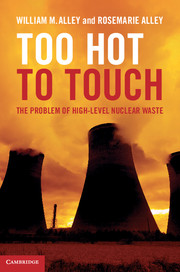Appendix - Discussion questions
Published online by Cambridge University Press: 05 February 2013
Summary
Science and risk
(Part I) The long-lived radioactivity and intense heat generated by radioactive decay make high-level nuclear waste unique among society's wastes. How do these characteristics affect how the problem is viewed and the difficulty of resolving it?
(Part I) Many Americans today have a diminished trust in Congress and the federal government. How do you think most people view scientists?
(Part I) For decades, the international scientific community has viewed a geologic repository as the only viable “solution” to dealing with the waste. Nonetheless, many people continue to think that we should recycle the waste. What are the arguments for and against reprocessing? Given these complexities, based on your reading of Chapter 7, should reprocessing be part of the nuclear fuel cycle?
(Part I/Part II) While the “uncertainty factor” is a problem with developing a geologic repository, many Americans appear to be more comfortable with the uncertainties associated with spent-fuel pools and open-ended dry cask storage. How would you explain this paradox?
(Part II) One of the characteristics of scientific research is that as new information is obtained toward resolving one question, new questions arise. Give examples of this from the book. How do you make any policy decisions regarding high-level waste when the scientific studies continue to raise new questions?
(Part II) From a scientific viewpoint, what were the strengths of a proposed geologic repository at Yucca Mountain? What were the weaknesses? How did the scientific surprises and nuances discussed in the book complicate these strengths and weaknesses? In your opinion, based purely on the science, should Yucca Mountain have continued through the licensing application process or should it have been shut down? What about when we take into consideration competing stakeholder views?
(Part II) Determining the regulatory standards for Yucca Mountain was a highly contentious issue (Chapter 17). Among the controversies was the ruling by the US Court of Appeals in 2004 that the timeframe for measuring compliance with the standards should be one million years rather than the 10,000-year period proposed by the Environmental Protection Agency. Summarize the contributing factors to this ruling. If you had been the judge in this appellate court, how would you have ruled? How would you have supported your ruling?
- Type
- Chapter
- Information
- Too Hot to TouchThe Problem of High-Level Nuclear Waste, pp. 330 - 333Publisher: Cambridge University PressPrint publication year: 2012



